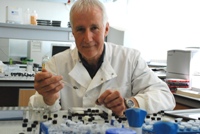Wake-up call for TB

Professor Mike Young
08 October 2008
The Aeras Global TB Vaccine Foundation, which was founded to develop new, cost-effective TB vaccines for use in the developing world, has licensed a discovery of a protein that is able to ‘wake up' dormant Mycobacterium tuberculosis bacteria that cause TB.
The research and the fundamental knowledge that came out of it could be used to develop a vaccine that either stops infecting TB bacteria from taking hold or, for the one in every three people world-wide who are already carrying a latent TB infection, prevents dormant bacteria from ‘waking up'.
Another possible strategy could be to deliberately ‘wake up’ dormant bacteria in a controlled way so they can be destroyed with antibiotics.
In the late 1990s, researchers funded by BBSRC discovered a new family of proteins that were able to resuscitate bacteria found harmlessly in and around the human body.
When ‘awoken’ from dormancy the bacteria were then much more susceptible to attack from antibiotics. The team led by Professors Mike Young and Doug Kell at Aberystwyth University together with Prof Arseny Kaprelyants of the Bakh Institute of Biochemistry, Russian Academy of Sciences, Moscow, identified the gene in the bacterium that produced the protein and went on to discover the corresponding genes in M. tuberculosis.
This research has now been licensed by Aeras after years of development. Aeras plans to take its recombinant BCG (AERAS-407) vaccine, based in part on the Aberystwyth work, to clinical trial in 2009.
Prof Young at the Institute of Biological, Environmental and Rural Sciences, said: “Current TB treatments can go on for over six months and can still leave bacteria in the body that can cause the disease when they resume active growth and multiplication.
"Our discovery, which is now being developed into a vaccine, might help prevent the establishment of persistent infections in the first place or, alternatively, it might prevent persisting organisms in individuals with latent TB from reawakening at all.
”TB kills around 1.7 million people around the world every year. I hope that our research will now be rapidly translated into a vaccine that can help as many of these people as possible.”
Dr Alf Game, BBSRC Deputy Director of Research, said: “This discovery came out of research in the basic biology of a different bacterium. It shows that we need to strive to understand the fundamental workings of the world around us and from that we can identify how to tackle challenges, such as dangerous diseases, that we all face.”
The original BBSRC-funded basic research was conducted in the 1990s at Aberystwyth University by Professors Mike Young and Doug Kell. Doug Kell has recently been appointed BBSRC’s new Chief Executive.
About the Aeras Global TB Vaccine Foundation
The Aeras Global TB Vaccine Foundation is a non-profit product development partnership working to develop new vaccines against TB and to ensure their availability to all who need them. It receives funding from the Bill & Melinda Gates Foundation, the US Centers for Disease Control and Prevention and the Dutch, Danish and Norwegian Governments. www.aeras.org
About BBSRC
The Biotechnology and Biological Sciences Research Council (BBSRC) is the UK funding agency for research in the life sciences. Sponsored by Government, BBSRC annually invests around £420 million in a wide range of research that makes a significant contribution to the quality of life for UK citizens and supports a number of important industrial stakeholders including the agriculture, food, chemical, healthcare and pharmaceutical sectors. http://www.bbsrc.ac.uk
About Aberystwyth University
Founded in 1872, Aberystwyth was the first university institution to be established in Wales. Today, it has 8,000 registered students, including over 1,100 postgraduates across eighteen academic departments.
The University is committed to developing its reputation as a provider of high quality teaching and excellence in research. In April 2008 Aberystwyth University established the Institute of Biological, Environmental and Rural Sciences (IBERS). With more than 300 staff and an annual budget of more than £20 million, IBERS is one of the largest groups working in this field in Europe and is ideally placed to respond to the challenges of sustainable land use, climate change, and the security of food and water supplies. In July 2008 the University announced a five year investment programme that will see £55m invested in new research and teaching facilities and scientific appointments at IBERS.



